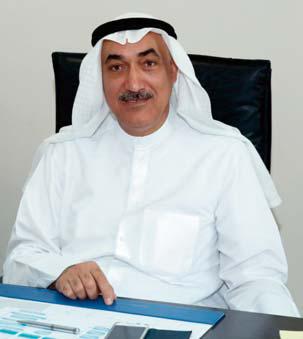 Marzouk Al-Shraifi
Marzouk Al-ShraifiWith a new fleet of Kuwait Airways planes on the way and the growing power of the aviation industry in the region as a whole, there has arose a growing demand, especially among young nationals, to study aviation. At the same time, however, there are few aviation schools in the Gulf. But a new specialized college in Kuwait hopes to fill that void.
The College of Aviation Technology (CAT) was partially launched last year and welcomed its first students. “Although the aviation industry at the moment is on a low note in Kuwait, we expect it to improve in 2018, as we know that Kuwait Airways has placed a large order for Airbus and Boeing aircraft, and these will start coming in by 2018/2019. The airline will be looking for licensed staff and we are preparing them for this,”
Marzouk Al-Shraifi, Member of the Board of Trustees and Deputy Dean, told Kuwait Times. CAT only has approval for ground training and not training of pilots, which still happens abroad. “The demand for pilot training is increasing, but for that we need to fly, have a lot of aircraft, an airfield and instructors. When we start the program for pilots, we will do it in a different way, as we will teach the academic part here, and for the practical part, they will get training either in Britain, Jordan or the UAE,” stated Shraifi.
Male and female students welcome
“Currently, 42 students are studying at the college, the majority of whom are from the ministry of education on internal scholarships. Both genders, from all nationalities are welcome to join the college. Their grades should be at least 65 percent or more for students from public schools. We currently have five female students, and last semester, the best student with the highest scores was female,” he added. “The students will study four years at the college, two years theoretical and two practical, and they will get a higher national diploma in avia-tion technology, which is supervised by the Scottish Qualifications Authority (SQA). They will also receive an International Aviation Safety Agency (IACA) certificate. If they want to continue, they can study one more year to get a bachelor’s degree, which is also available in the United Arab Emirates,” said Nael Noaman, Academic and Training Affairs Manager. “There is a difference between students who graduate from public schools and those who graduate from private schools, who are definitely more disciplined. Also, the English language skills of the second group are much better than those of the former,” added Noaman. CAT is affiliated with Air Service Training (AST). “This is considered the best school in Europe, and was founded in 1931. AST has worked with Kuwait Airways before. Its main base is in Perth in Scotland, with an academy and airfield where we work on airplanes. It’s easier for local students to study in their country than to go study in Scotland, although many are studying there. AST has partnerships with academies overseas including two in Indonesia, one in Jordan, one in Iceland and hopefully soon in Kuwait,” noted Ian Jones, Compliance Monitoring Manager, Air Service Training Limited. “Some students with diminutive body structures believe they can’t do this job and ask me, ‘can I be an engineer?’ And I say yes, as today to work as an engineer we need facilities and equipment. We don’t need muscles, but we need brains. So we don’t differentiate between boys and girls. They both do the same assignments and the same practical training,” Jones added. “When students first come here, we place them in an English course, where the language is more general than technical, and we teach them subjects such as mathematics, physics, theories of flying and others to change the Arabic terminology into English, as the entire education is in English. In the second semester, they take more technical English as preparation for the diploma, to be ready to understand this terminology. Those with excellent English skills can join the second semester directly. We separate the students according to their level,” explained Noaman.
By Nawara Fattahova











